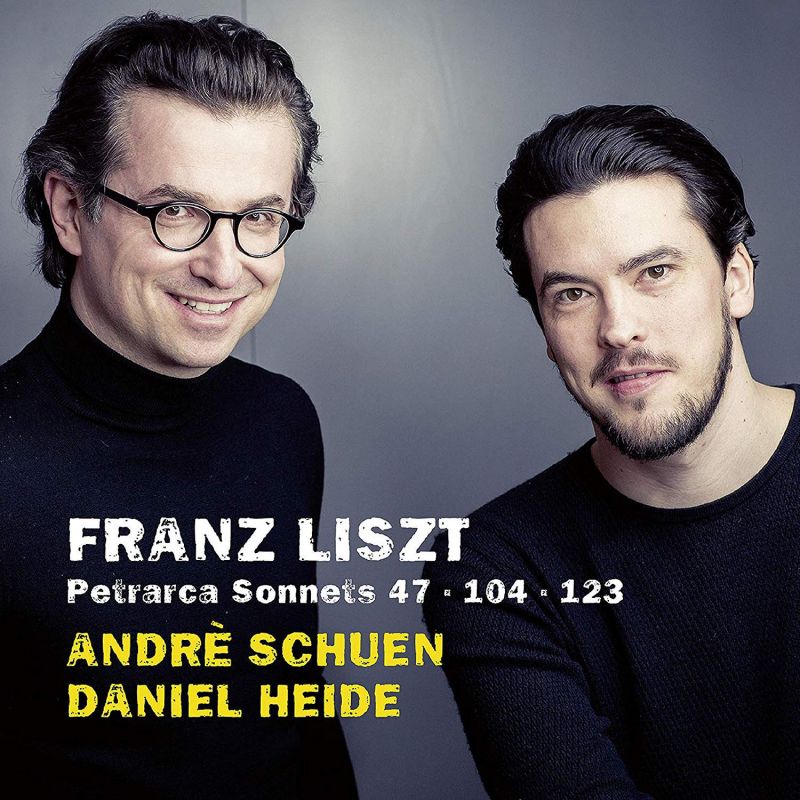LISZT Three Petrarch Sonnets (Andrè Schuen & Daniel Heide)
View record and artist detailsRecord and Artist Details
Composer or Director: Franz Liszt
Genre:
Vocal
Label: Avi
Magazine Review Date: 11/2019
Media Format: CD or Download
Media Runtime: 65
Mastering:
DDD
Catalogue Number: AVI8553472

Tracks:
| Composition | Artist Credit |
|---|---|
| Années de pèlerinage année 2: Italie, Movement: Sonetto 104 del Petrarca |
Franz Liszt, Composer
Daniel Heide, Piano Franz Liszt, Composer |
| Années de pèlerinage année 2: Italie, Movement: Sonetto 123 del Petrarca |
Franz Liszt, Composer
Daniel Heide, Piano Franz Liszt, Composer |
| Années de pèlerinage année 2: Italie, Movement: Sonetto 47 del Petrarca |
Franz Liszt, Composer
Daniel Heide, Piano Franz Liszt, Composer |
| (3) Sonetti di Petrarca |
Franz Liszt, Composer
Andrè Schuen, Baritone Daniel Heide, Piano Franz Liszt, Composer |
| Oh! quand je dors |
Franz Liszt, Composer
Andrè Schuen, Baritone Daniel Heide, Piano Franz Liszt, Composer |
Author: Tim Ashley
To my knowledge, this is the first time that all three Petrarch cycles have been placed side by side on disc, and the differences are instructive. The piano version, begun almost immediately after the first vocal set was complete, is effectively a straightforward transcription of the songs, though the austere, fragmented 1882 set differs so substantially from its predecessor as to constitute a separate work, albeit deploying the same thematic material and substantially the same texts.
Schuen’s dark, at times almost gritty tone and pungent, declamatory way with words suit the later version down to the ground. Emotions bite. The text is vividly delivered. ‘Pace non trovo’ is a real eruption of frustration and anger. But Schuen can sweeten the sound into a beautiful mezza voce, heard to wonderful effect at the end of ‘I’ vidi in terra’, where his voice floats upwards as ‘celestial harmony’ briefly stills the natural world around him.
Many of the same qualities inform his performance of the 1846 set. Originally written for tenor, this has become the standard version for many singers, albeit in transposition, and Schuen is by no means the first baritone to tackle it. There are a couple of moments of effort, and you may prefer the warmer tone of, say, Dmitri Hvorostovsky (Ondine, 12/15) here, but there are also some marvellous things: long, quiet lines that flow with consummate ease, and a tremendous surge of emotion at ‘chiamando il nome di mia Laura’ in ‘Benedetto sia’l giorno’ that knocks you sideways. ‘Oh! Quand je dors’, meanwhile, is almost operatic in its intensity, that mezza voce speaking volumes at the end yet again.
Heide, meanwhile, is a fine Liszt accompanist, always knowing when to assert himself and when to pull back and let the vocal line do the work. He very much comes into his own in the piano set, fully surmounting its technical challenges and playing with rapt introversion throughout. The booklet notes, Heide’s own, make fascinating reading but don’t provide anything like the scholarly apparatus of Hyperion’s Liszt series. No translations are given, and the texts come in their original versions, with no indication given of the variants Liszt deploys. But it’s a fine start to what will hopefully be a fine series, and I look forward with pleasure to its further instalments.
Discover the world's largest classical music catalogue with Presto Music.

Gramophone Digital Club
- Digital Edition
- Digital Archive
- Reviews Database
- Full website access
From £8.75 / month
Subscribe
Gramophone Full Club
- Print Edition
- Digital Edition
- Digital Archive
- Reviews Database
- Full website access
From £11.00 / month
Subscribe
If you are a library, university or other organisation that would be interested in an institutional subscription to Gramophone please click here for further information.




